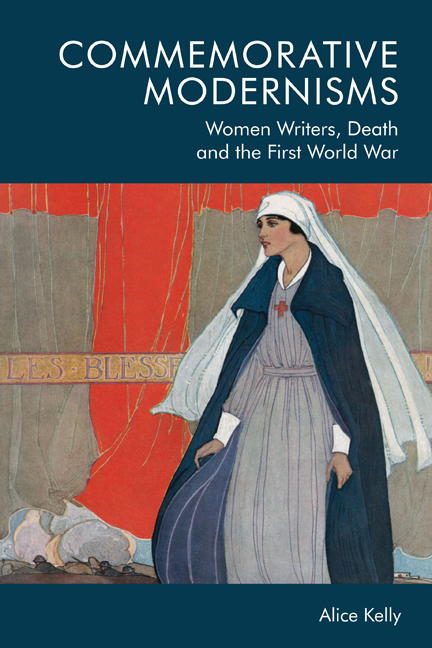Book contents
- Frontmatter
- Contents
- List of Figures
- Acknowledgements
- Dedication
- Introduction: A Culture Surcharged with Death
- Part One Death in Proximity: Wartime Commemorations
- Part Two Grief at a Distance: Civilian Modernisms
- Part Three Modernist Death: Postwar Remembrance
- Conclusion: Modernism’s Ghosts
- Bibliography
- Index
Introduction: A Culture Surcharged with Death
Published online by Cambridge University Press: 15 October 2020
- Frontmatter
- Contents
- List of Figures
- Acknowledgements
- Dedication
- Introduction: A Culture Surcharged with Death
- Part One Death in Proximity: Wartime Commemorations
- Part Two Grief at a Distance: Civilian Modernisms
- Part Three Modernist Death: Postwar Remembrance
- Conclusion: Modernism’s Ghosts
- Bibliography
- Index
Summary
One of the key questions of modern literature was the problem of what to do with the war dead. In March 1915, just eight months into the First World War, in a paper delivered in Vienna, Sigmund Freud presciently noted that ‘we cannot maintain our former attitude towards death, and have not yet discovered a new one’. Freud expressed a common sentiment: that the ongoing war had already fundamentally changed the ways that people thought about death. The accompanying questions of how to bury, memorialise and grieve the dead began as soon as the war itself did – in August 1914 – and would continue long into the postwar period.
This book is about the ways that women writers wrote about death during and after the First World War. It examines the impact of the vast, unanticipated mortality on literary representations of death in British and American writing during and immediately after the war. It considers the particular role that women writers played in enacting, rehearsing and mediating the crisis in attitudes towards death caused by the war, while it was still ongoing and into the postwar period. The major premise of this book is that the extent and nature of the enormous death toll of the war changed the way that death was represented in literature: what Katherine Mansfield referred to as ‘a change of heart’, in regards to Virginia Woolf's 1919 novel Night and Day. A second premise is that the unprecedented war losses and the subsequent cultures of both private memorialisation and public commemoration are a crucial yet overlooked context for literary development in this period, including but not limited to modernism. This book argues for the intertwining of modernist, war and memorial culture, suggesting that much of what we call modernist experimentation in terms of death can be traced to its specific sociohistorical wartime and postwar context.
The writers I examine here wrote death within a range of genres: some predominantly realist, some decidedly more modernist, and others working on a scale somewhere in between. Rather than radically redefining these terms, my argument extends and refines the concepts as understood in recent scholarship.
- Type
- Chapter
- Information
- Commemorative ModernismsWomen Writers, Death and the First World War, pp. 1 - 36Publisher: Edinburgh University PressPrint publication year: 2020



